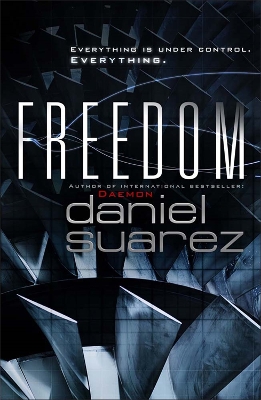Reviewed by clq on
This sequel incorporates all of my least favourite elements of the first book, and completely leaves out most of the stuff I loved. The first book was a clever, somewhat subtle, "look at how technology can be twisted into doing really mad but ultimately cool things", kind of story that was built up at a pace which really made the climaxes impactful. In Freedom™ technology has already gone completely mad, and just keeps getting madder. And madder. Where the first book managed to balance on a fine line between realism and fantasy, this book not only steps off the line, but runs perpendicularly to it for the duration. It is turned up to 11 throughout, and the attempts at inter-personal moments between the characters drown in the blood of limbs being cut off. There is a lot of great action, sure, but it is so frequent and expected that none of it really becomes exciting.
What this book does do is make a rather solid point about the world we live in, the people who control us, what defines a free society, whether a society can really be free, and so on, and so forth. However, the point is made so frequently, and in so many different ways, that even one of the most interesting perspectives on a global, connected society I have read in a long time starts to become tedious. Nevertheless, the "world view" part of the book is very much there, and it does hold up.
Finally, the ending. Without spoiling anything, it seems apparent that the ending relies on the reader feeling a certain way. I didn't. Not because I necessarily disagreed with what the book wanted me to feel, but because I just didn't care anymore. At the end of the first book I could relate to the universe, to the characters in it, and the situation they found themselves in. The story was told so meticulously that I was forced to have an opinion. After all, the situation seemed plausible. Unlikely, but plausible.
At the end of this second book I feel like I might as well have read a story about the alien mining industry on the planet Jupiter. It has become too distant for me to care. That's a real, real, pity.
I know I'm being a lot harsher than the book deserves, and had I read Freedom™ without first reading Daemon I would probably have accepted Freedom™ as a fun, but somewhat predictable and overdone, tech-inspired read. But I was hoping and wishing for a new Daemon, and I didn't get it.
Oh well.
Reading updates
- Started reading
- 17 August, 2014: Finished reading
- 17 August, 2014: Reviewed
